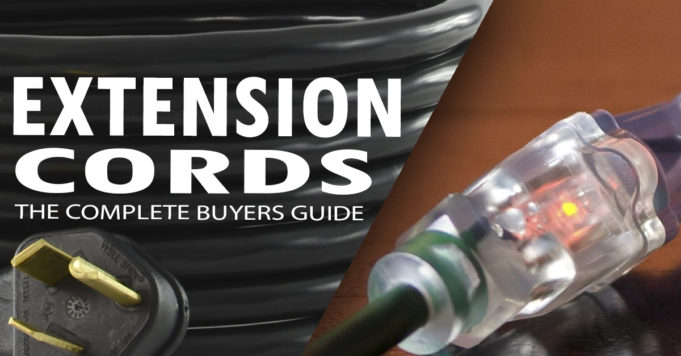How to Choose The Best Extension Cord
Best Extension Cord for Indoor Use
These cords are best used for simple household appliances and electronics such as wireless routers, fans, lamps and other light uses. Some of them may also be rated for outdoor use, although we will get into outdoor specialists further down.
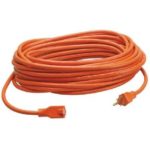 |
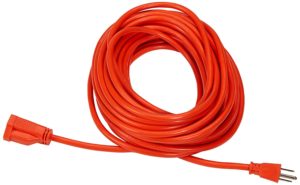 |
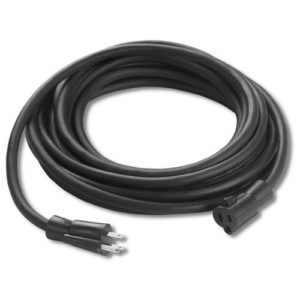 |
| Coleman Cable |
AmazonBasics |
Husky Mounts |
| 25ft, 50ft, 100ft sizes | 50ft, 100ft sizes | 1ft – 100ft sizes |
| 16/3 gauge wire | 16/3 gauge wire | 16/3 gauge wire |
| 10 amp rating | 13 amp rating | 13 amp rating |
| PVC insulated jacket | Vinyl insulated jacket | Vinyl insulated jacket |
| 1-year warranty | 1-year warranty | 1-year warranty |
| Suitable for indoor, household use. Fans, lamps, etc. | Suitable for indoor, household use. Fans, lamps, etc. | Suitable for indoor, household use. Fans, lamps, etc. |
| $ | $ | $$ |
| CHECK PRICE ON AMAZON | CHECK PRICE ON AMAZON | CHECK PRICE ON AMAZON |
Best Outdoor Extension Cord
These cords are designed for use in outdoor environments. The insulated casings and plugs are fashioned in a way that will better stand up to the elements and won’t degrade as easily. If you are using them outdoors or with larger power tools, you want to make sure you go for a larger gauge wire (~12-14) and a longer cable will be more versatile.
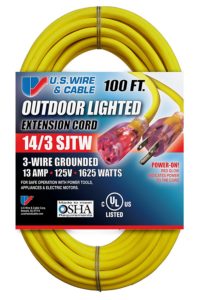 |
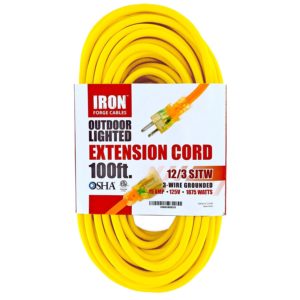 |
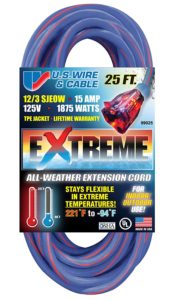 |
| US Wire 100ft Outdoor Extension Cord |
Iron Forge 100ft Outdoor Extension Cord |
US Wire 25ft All-Weather Outdoor Extension Cord |
| 100 ft length | 100 ft length | 25 ft length |
| 14/3 gauge wire | 12/3 gauge wire | 12/3 gauge wire |
| 13 amp rating | 15 amp rating | 15 amp rating |
| SJTW insulated jacket | Vinyl insulated jacket | 100% TPE abrasion resistant jacket |
| Limited lifetime warranty | Lifetime Replacement warranty | Limited lifetime warranty |
| Made in USA & China | Made in China | Made in the USA |
| Lighted plug | Lighted plug, reinforced blades | Lighted, molded plugs |
| Great all-around, good for indoor/outdoor use household electronics, power tools <13A rating | Best all-around, good for indoor/outdoor, household electronics, power tools <15A rating | Best for use in cold temperatures, stays flexible down to -94F, power tools <15A |
| $ | $$ | $$ |
| CHECK PRICE ON AMAZON | CHECK PRICE ON AMAZON | CHECK PRICE ON AMAZON |
Best Heavy Duty Extension Cord
Next up we have our heavy duty extension cords. Be sure to also check out the list below of multi outlet cables, which are also suitable for heavy duty use.
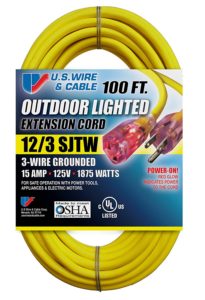 |
 |
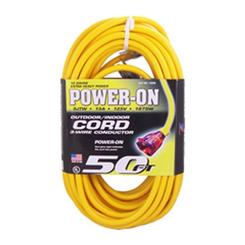 |
| US Wire 100ft Heavy Duty Extension Cord |
US Wire 50ft Heavy Duty Extension Cord |
Prime 50ft Heavy Duty Extension Cord |
| 100 ft length | 50 ft length | 50 ft length |
| 12/3 gauge wire | 12/3 gauge wire | 10/3 gauge wire |
| 15 amp rating | 15 amp rating | 15 amp rating |
| SJTW vinyl outer jacket | SJTW vinyl outer jacket | SJTOW PVC jacket |
| Limited lifetime warranty | Lifetime limited warranty | Warranty info not available |
| Made in USA & China | Made in USA & China | Made in China |
| Lighted plug | Lighted plug, reinforced blades | Lighted plugs, nickel-coated brass plugs |
| Rugged all-around cord, suitable for use down to -35F, | Medium flexibility, durable exterior, affordable | Great heavy duty cable, suitable for use down to -54F |
| $$ | $ | $$$ |
| CHECK PRICE ON AMAZON | CHECK PRICE ON AMAZON | CHECK PRICE ON AMAZON |
Best Multi Outlet Extension Cord
Because having multiple outlets can increase the stress on the cable, anything smaller than 14 gauge wire can potentially be a risk if you’re not careful. Our list for the best multi outlet extension cord actually only includes a single product, because it is the only one that is heavy duty enough and of proper rating to handle multiple plugs. However, it is available in multiple sizes so you can find the perfect length for your uses.
 |
| US Wire Multi Outlet Extension Cord |
| Multiple lengths available: 2-15ft, 25ft, 50ft, 75ft, 100ft |
| Multiple gauges available: 10/3, 12/3 and 14/3 |
| Maximum Amps vary depending on gauge |
| SJTW thermoplastic ruged outer coating Double jacketed for extradurability |
| Limited lifetime warranty |
| Made in USA & China |
| 3x plug inputs |
| Rugged all-around cord, suitable for use down to -35F, |
| NOTE: Some tool plugs are “guarded” and won’t fit multi-outlets like this one. Double check that the tool you are using will fit, otherwise you may need to use an additional cable If you are looking for a different kind of multi-outlet cable, one with outlets evenly spaced along the length of the cable, this is the best one we’ve found. |
| Price varies depending on length/gauge Compare Prices |
| CHECK PRICE ON AMAZON |
Best Retractable Extension Cord
A retractable extension cord can be awesome to have around the house, since they’re so much easier to store and transport. Most of the ones you see are typically smaller 16 gauge, though, so those are best suited for light household use. But, there are some more heavy duty ones that you can use with power tools and larger electronics. Back to top
Note: the MasterPlug is not technically a retractable, and belongs below with reels, but we wanted to give you a comparison – maybe you though you wanted a retractable but actually wanted a reel!
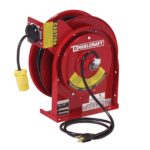 |
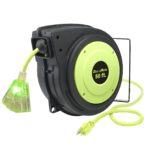 |
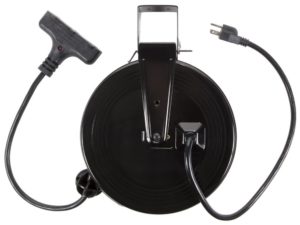 |
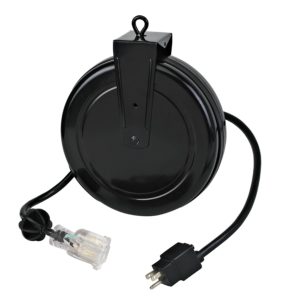 |
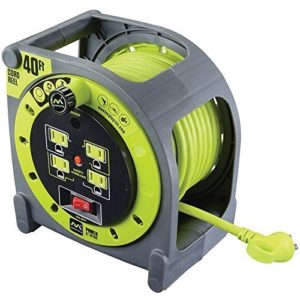 |
| ReelCraft Retractable Extension Cord |
Flexzilla Retractable Extension Cord |
Bayco Retractable Extension Cord
|
AlertStamping Retractable Extension Cord |
Masterplug Retractable Extension Cord |
| 45ft of 12/3 cable | 50ft of 14/3 cable | 30ft of 16/3 cable | 20ft of 12/3 cable | 40ft of 14/3 cable |
| 4ft lead-in cable | 4.5ft lead-in cable | 22.5″ lead-in cable | 18″ lead-in cable | No lead-in cable, outlets are on reel |
| Reinforced steel housing | Plastic reel housing | Heavy duty metal housing | Plastic housing with hook | Plastic housing |
| 1x outlet at end of cord | 3x outlets at end of cord | 3x outlets at end of cord | 1x outlet at end of cord | 4x outlets mounted on reel |
| No surge protection | No surge protection | No surge protection | Built-in circuit breaker | Built-in surge protector |
| 15 amp rating | 13 amp rating | 13 amp rating | 15 amp rating | 10 amp rating |
| Deigned for industrial use | Good all-around, triple plug doesn’t fit all tools | Good for household use, 16 gauge is on small side | Great for heavy duty tools | Compact, easy to store |
| Can mount to wall, ceiling or bench | Mounting bracket rotates 180 degrees | Mounting brackets included | Hook for hanging or wall mount included | Integrated wall mount |
| Made in USA | Made in China | Designed in USA | Made in China | Made in China |
| Best for Heavy Duty Use | Best all-around | Best for small electronics; light use | Best buy | Best for small budgets |
| $$$$ | $$$ | $$ | $$ | $ |
| CHECK PRICE ON AMAZON | CHECK PRICE ON AMAZON | CHECK PRICE ON AMAZON | CHECK PRICE ON AMAZON | CHECK PRICE ON AMAZON |
Best Cable Reel
If you don’t opt for a retractable cable, you may be looking for a better way to store your long cables than the typical haphazard spool you usually try to produce. An extension cord reel is a great way to store your cables, and some even function as circuit breakers with outlets built in. Check out our recommended products.
IMPORTANT: Remember as we mentioned earlier, to never use any cables while still coiled up. Being coiled up tightly does not allow the heat produced to dissipate and can be an extreme fire/shock hazard. Always extend the cord while in use, even if you don’t need all the length!
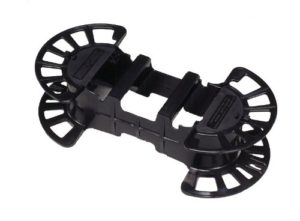 |
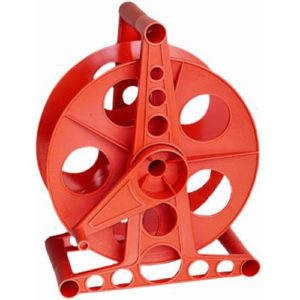 |
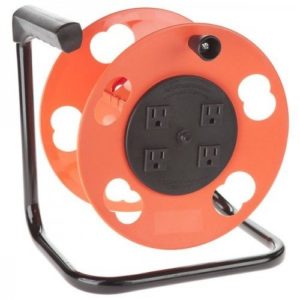 |
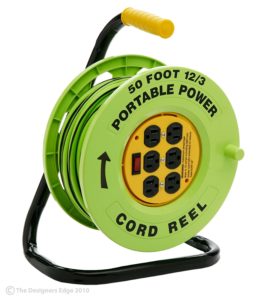 |
| Alert Stamping Wrap-n-Carry Reel | Bayco 150ft Cord Reel | Bayco Storage Reel & Circuit Breaker | Designers Edge Storage Circuit Breaker |
| Rated for 100ft of 16/3 cable (flush) Actual capacity is greater |
Rated for 150ft of 16/3 cable Can fit 100ft of 12/3 (tightly) |
Rated for 100ft of 14/3, or 75ft of 12/3. Can fit 100ft of 12/3 (tightly) | Has a built-in 50ft 12/3 cable. 14/3 version available. Similar to Masterplug above |
| Sturdy but lightweight plastic construction | Lightweight plastic design | Metal mount and handle, flexible plastic reel. No cord included | Metal mount and handle, plastic reel. Included 50ft cord |
| Wall-mountable | Not wall mountable | Not wall mountable | Not wall mountable |
| Easy to spool and remove cables | Hand-crank handle | Built-in resettable 15 amp circuit breaker with 4x outlets | Built-in resettable 15 amp circuit breaker with 6x outlets |
| Round shape prevents kinks | Spool can tip easily | Fits long, thick cables | Heavy duty 12/3 cord |
| Rated for 100ft 16/3 cable, you can fit 50ft of 12/3 cable if you do it properly. You can fit 75ft+ of 12/3 if it “overflows” pas tthe edges. You can also fit 25ft of 10/4 wrapped up tightly. | Spooling is easy, we recommend going from the middle of your cable like some customers mentioned. You should be unraveling it completely to use it safely anyways! | Need to use your own cord, flexible plastic reel withstands breaking from drops. 15 amp breaker is more than enough for most uses | Only 50ft of reach, but should be enough for most uses. Having 6 outlets is great, but you shouldn’t be using them actively at once. Large 12/3 more heavy duty than MasterPlug (above) |
| Great cheap and basic storage solution | Basic reel with good functionality, easy to wrap up your cable when finished | Great for storing longer cables 100ft+ and handy to extend power. 15 amp rating is good for most power tools | Great for extending power reach and have multiple outlets available. 15 amp rating is good for most power tools |
| $ | $ | $ | $$ |
| CHECK PRICE ON AMAZON | CHECK PRICE ON AMAZON | CHECK PRICE ON AMAZON | CHECK PRICE ON AMAZON |
Best Switched Cord
If you are looking for an extension cord with a switch, you’re likely looking to extend the reach of a lamp, light or other appliance you want to easily switch on and off: your Christmas lights or tree, patio lights, They really only make these for household use, with ~16 gauge cable, so if you’re looking for something more heavy duty, you probably won’t find it and will want to keep it to light use only. Check out our recommendations for these super handy extenders.
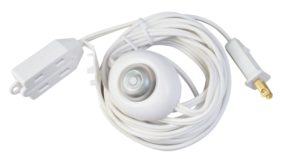 |
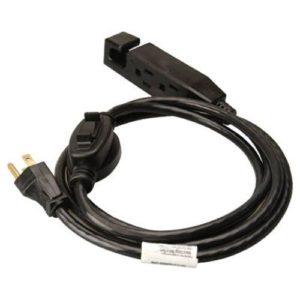 |
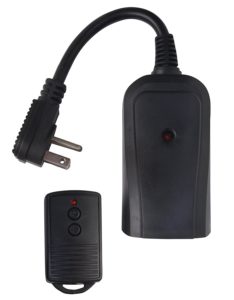 |
| Woods 15ft Switch Light |
Master Electrician 6ft Indoor Switch Cable |
Woods Weatherproof Outdoor Outlet Remote |
| 18/2 cable | 16/3 cable | 16/3 power cord, |
| 15ft, lighted switch mounted 4 feet from plug (not outlet) | 6ft long, switch mounted ~6 inches from plug | 6″ cord. Company claims up to 60ft range, actually ~50ft |
| Max 5 amp rating | Max 6 amp rating | Max 10 amp rating |
| 2x outlets on plug (double prong) |
2x outlets on plug (double prong) | One remote paired with each base. |
| Indoor use only | Indoor use only | Rated as waterproof, but we would definitely not use it without being covered |
| Overall, it’s a great cord for indoor use for a lamp or other low-amperage electronic. Some people have issues with some cords not working, so keep in mind these cheap cords (~$8) don’t have a ton of quality | Less issues with cords not working with this cable, but there are still some. Another cheap extender for ~$10, so you can’t go wrong | While this remote isn’t exactly an extension cord with a switch, it deserves a spot on the list. It’s super handy for indoor electronics, outdoor lights and more. It’s a very popular product for good reason |
| $ | $ | $$ |
| CHECK PRICE ON AMAZON | CHECK PRICE ON AMAZON | CHECK PRICE ON AMAZON |
Flat Plug Extension Cord
A flat plug extension cord is great for extending the reach of household appliances where you also want to “hide” the cord behind furniture like a desk, dresser or wardrobe. Instead of sticking straight out of the wall, the cables come out the side of the plug, and the cord itself is also flat instead of round, in order to maintain a slim, low profile. This allows you to run the cord discretely from the wall outlet to where you need it to be. Back to top
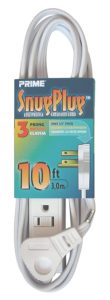 |
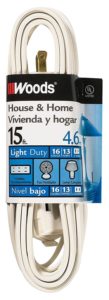 |
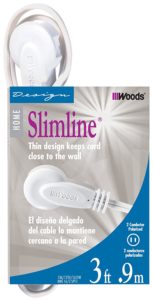 |
| Prime 10ft Flat Plug |
Coleman 15ft Flat Plug |
Woods 3ft Flat Plug |
| 16/3 wires | 16/3 wires | 16/2 wires |
| 3x 3-conductor outlets (all 3 on one side) | 2x 3-conductor outlets (all 3 on one side) | 3x 2-conductor outlets (2 on one side, 1 on the other) |
| 13 amp rating | 13 amp rating | 13 amp rating |
| Cord extends down out of outlet at an angle, to the right | Cord extends down out of outlet at an angle, to the right | Cord extends down out of outlet at an angle, to the left. |
| We definitely don’t recommend using all three outlets at once, since it just isn’t rated for that kind of use. It’s great to extend the length of a small appliance like a lamp (maybe two), but don’t overdo it. Also available in 6ft and 13ft. | Another great affordable option to extend a small electronic like a lamp (maybe 2) but we wouldn’t push this small 16/3 cable. Note: the image on Amazon is not updated, the new version of this cord has all three outlets on the same side of the end. Also available in 8ft. | Great option if you need just a couple extra feet of reach for a 2-pronged appliance like a lamp or clock. 16/2 wire is not meant for heavy use and we wouldn’t recommend having two things plugged in at once. For around $3 it’s a great deal. |
| $ | $ | $ |
| CHECK PRICE ON AMAZON | CHECK PRICE ON AMAZON | CHECK PRICE ON AMAZON |
Best Dryer Extension Cord
Picture this – you want to stack your washer/dryer, but the dryer cable won’t reach the outlet. Or, you want to renovate and move your dryer but now the cable won’t reach the receptacle. Sound familiar? The cables that come with dryers are unfortunately almost always quite small, and many people don’t even realize that a dryer extension cord exists! As a result, many folks call their electrician and move their 220V receptacle just a few feet when a new cord would do the trick. While we typically recommend not using extension cords as long term solutions, these aren’t exactly an extension cord, just a longer replacement cable. It will be important to check if your dryer is a 3 or 4 prong wire. Older dryers run on 3-prong wires, while new dryers are 4-prong. Here is a great guide to convert your 3-prong to 4, if you so desire. Be sure to read carefully, as dealing with electricity is always a safety hazard. It’s also recommended to have an expert install either of these cables, unless you are very comfortable doing so. We take no responsibility for damages or injuries in installing these cables if you choose to do so. Regardless, we found a dryer extension cord for 3-prong and 4-prong models below for you to check out.
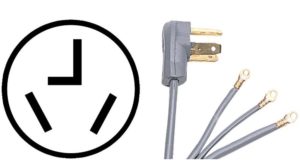 |
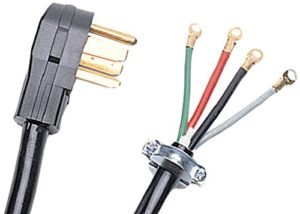 |
| Certified Appliance Dryer Extension Cord (3-prong) |
Certified Appliance Dryer Extension Cord (4-prong) |
| 10ft | 4ft, 5ft, 6ft, 10ft |
| 30-amp, 250-volt | 30-amp, 250-volt |
| Wires are NOT color coded for installation; important to do so properly or have an expert install to avoid injury Recommended to have an expert install! |
Wires are color coded for installation Recommended to have an expert install! |
| NOT UL listed | UL listed |
| Unfortunately this cable is only available in a 10ft length. If you have excess cable, do NOT coil it up, but keep it spread out to avoid excess heat production and failure | It is recommended to always buy as short a cable as possible, as increasing the length of cable increases resistance. If you do buy a longer cord and have excess length, do NOT keep it coiled up. |
| $ | $$ |
| CHECK PRICE ON AMAZON | CHECK PRICE ON AMAZON |
30 Amp Extension Cord
A 30 amp extension cord is a great companion for your RV or camper. When you’re running every appliance in your RV off of it, it needs to be heavy duty and handle a ton of current; hence the 30 amp rating. Plus, if you have a 25-50ft additional reach, you don’t have to worry as much about where you park your rig! Overall, these cables are godsend and you’ll wonder how you ever lived without it. Here’s the three we recommend, you’ll notice they are all very similar, and they all do a great job. You can’t go wrong between any of them, and we suggest just seeing which is priced better at the moment.
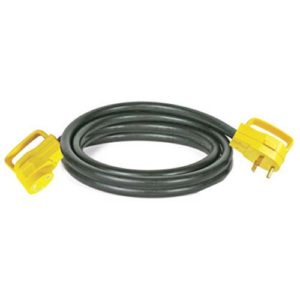 |
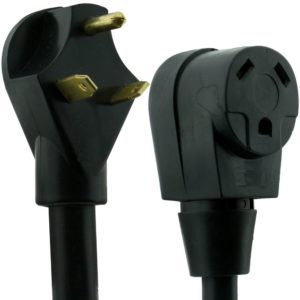 |
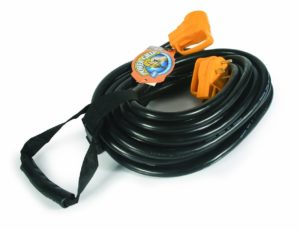 |
| Camco 25ft 30 Amp Extension Cord |
Nu-Cord 25ft 30 Amp Extension Cord |
Camco 50ft 30 Amp Extension Cord |
| 25ft long | 25ft long | 50ft long |
| 30 amp rating | 30 amp rating | 30 amp rating |
| 10/3 cable | 10/3 cable | 10/3 cable |
| TT-30P Plug TT-30R Receptacle |
TT-30P Plug TT-30R Receptacle |
TT-30P Plug TT-30R Receptacle |
| Heavy duty design, outdoor rated | Heavy duty design, outdoor rated | Heavy duty design, outdoor rated |
| Plastic handles for easy unplugging – can inhibit shutting lids to box | Rubber ring on back of plug (not pictured) for easy unplugging – can inhibit shutting lids to box | Plastic handles for easy unplugging – can inhibit shutting lids to box |
| Plastic handles could potentially crack | Rubber plugs more durable than plastic | Plastic handles could potentially crack |
| $ | $ | $$ |
| CHECK PRICE ON AMAZON | CHECK PRICE ON AMAZON | CHECK PRICE ON AMAZON |
20 Amp Extension Cord
A 20 amp extension cord is most typically used to extend the reach of the 20 amp outlet on electric generators. You will want a heavy duty cable that can withstand a bit of abuse in the outdoors, but also thick enough gauge handle the 20 amps of current of whatever tool you are drawing from the generator with. Here are the three cables we recommend. Back to top
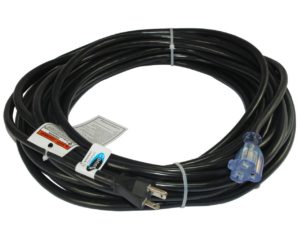 |
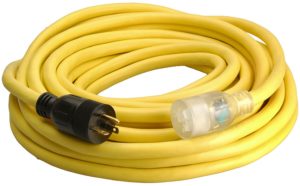 |
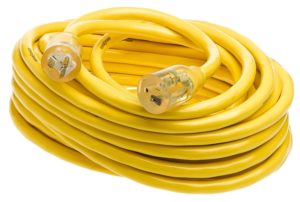 |
| Conntek 20 Amp Extension Cord |
Coleman Cable 20 Amp Extension Cord |
Yellow Jacket 20 Amp Extension Cord |
| 25ft or 50ft | 50ft or 100ft | 50ft or 100ft |
| 12/3 gauge cable | 10/3 gauge cable | 10/3 gauge cable |
| Black low-visibility jacket | Great hi-vis yellow jacket | Great high visibility yellow jacket |
| Heavy duty, outdoor rated | Heavy duty, outdoor rated, flame retardant | Heavy duty, outdoor rated, flame retardant |
| Lighted female plug end | Lighted female plug end | Both plug ends lighted |
| Slightly stiff in colder weather | Soft and flexible, even in cold weather | Soft and flexible, even in cold weather |
| 12/3 cable isn’t the thickest, may produce more heat than 10/3 cables. We typically recommend 10/3. Otherwise, great affordable cable | Great all-around cable for workshops and job sites. Great quality, slightly more expensive | Great for generators in workshops and job sites, fits 15 amp and 20 amp tools. Great quality and price |
| $ | $$ | $$ |
| CHECK PRICE ON AMAZON | CHECK PRICE ON AMAZON | CHECK PRICE ON AMAZON |
Best Welder Extension Cord
If you don’t have an extension cord for your welder, you are severely limiting the size and versatility of your workspace. Because a welder draws so much current, these cables need to be thick and heavy duty, and luckily we’ve found the perfect one. You can even find other uses for this cable like certain air conditioners or electric vehicle chargers. Check out the great features of this heavy duty cable.
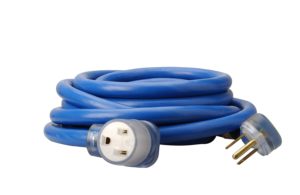 |
| Coleman Cable 25ft Welder Extension Cord |
| 25ft length |
| 8/3 gauge cable |
| 40 amps, 250 volts |
| Light-up female end plug indicates power on |
| Molded ends are low profile and convenient, improved safety |
| Heavy-duty STW jacket, with hi-vis blue coating Maintains flexibility, even in colder temperatures |
| Overall, a great heavy duty cable! |
| $$ |
| CHECK PRICE ON AMAZON |
A (Very) Quick & Dirty Lesson in Electricity and Resistance
There are a few things to consider when buying extending cables. Primarily, the most important thing is to ensure you are using a cable with a proper amps/amperage rating (current) for whatever appliance or tool you will use it with.
Electrical current, or the rate of flow of electrical current, is measured in amps. As you would expect, a small appliance like a lamp draws much less current than a power tool like a reciprocating saw would.
You may also notice that the appliance or tool you are you using through your cable doesn’t produce quite the same amount of power it does when plugged in directly to your wall outlet. This is because wires have a certain amount of resistance and as current runs through a wire, the electrical energy dissipates as it travels down the length of the wire.
A longer wire will then have more resistance, and a thicker gauge wire will have less resistance. In addition, this dissipated energy is e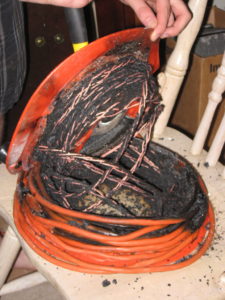 xpelled in the form of heat, which is one reason why the cables are surrounded by an insulated jacket. However, mis-using a cable can cause an excess amount of heat, producing a fire hazard by damaged the insulation. An example of mis-use would be using a cable that isn’t properly rated for the amount of current your tool is drawing – like using a 15 amp tool with a 10 amp extending cable, for example. The insulation can melt or crack, causing faults, shorts causing shocks or fires. Always make sure the cord is properly rated for your use.
xpelled in the form of heat, which is one reason why the cables are surrounded by an insulated jacket. However, mis-using a cable can cause an excess amount of heat, producing a fire hazard by damaged the insulation. An example of mis-use would be using a cable that isn’t properly rated for the amount of current your tool is drawing – like using a 15 amp tool with a 10 amp extending cable, for example. The insulation can melt or crack, causing faults, shorts causing shocks or fires. Always make sure the cord is properly rated for your use.
Wire Length, Thickness & Amps
So, for what we know now about resistance and wire thickness, with all other things being equal, it’s better/safer to use a shorter, thicker cable than a long, thinner one, both in terms of performance and safety. How do you tell if a wire is thicker or thinner? They are measured by “gauge” and it’s actually a little counter-intuitive. A thinner diameter wire will have a larger gauge (ex. 16 and greater), while a thicker diameter wire will have a smaller gauge (12 and smaller). Many folks use 16-gauge cables in their homes, however they are likely too thin for your uses. Gauge is measured in the unit AWGs, or American Wire Gauge.
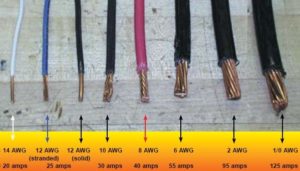 Although smaller 16-gauge cables are cheaper, they often won’t be able to handle the power you need to feed through them and will have lower amperage ratings. These cables are often the cause of residential fires as a result of them failing, due to the large amount of resistance and heat produced.
Although smaller 16-gauge cables are cheaper, they often won’t be able to handle the power you need to feed through them and will have lower amperage ratings. These cables are often the cause of residential fires as a result of them failing, due to the large amount of resistance and heat produced.
If you’re going to be extending a low-energy appliance like a lamp, then 16-gauge is probably fine. But we typically recommend 12-gauge or thicker cables since they can handle the electricity from your home’s outlets long-term, and are more versatile, since you can use them safely with larger tools and appliances. However, they are larger and heavier.
Often, when you’re looking to buy an extension cord, you’ll see several ratings such as the length in feet, maximum amps or voltage, or numbers like “12/3” like this one. The first number is indicating the wire gauge, and the second number is telling you how many wires are within the cable. So a 12/3 cable means that there are 3 wires combined in the cord, each with 12 gauge thickness.
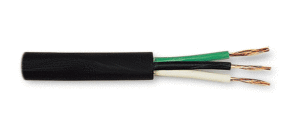 Cables also typically come in various lengths, up to 150ft long, and while we’ve established a longer cable isn’t as good as a shorter one, if you think you’ll need the length then go for a longer one. It’s better to use a longer cord than to daisy chain multiple cords together since you reduce the number of connections. But, as you use a longer cord, resistance increases. What does this mean for you? Well, you could get away with using a 25-foot 14 gauge cable with a larger tool like a table saw, but if you need a longer cable like one that is 100 feet long, you should be using a 10 or 12 gauge cable. There’s no perfect formula, but it’s typically better to go larger, since it’s more versatile. This table is a good quick outline for what cord size you can get away with using
Cables also typically come in various lengths, up to 150ft long, and while we’ve established a longer cable isn’t as good as a shorter one, if you think you’ll need the length then go for a longer one. It’s better to use a longer cord than to daisy chain multiple cords together since you reduce the number of connections. But, as you use a longer cord, resistance increases. What does this mean for you? Well, you could get away with using a 25-foot 14 gauge cable with a larger tool like a table saw, but if you need a longer cable like one that is 100 feet long, you should be using a 10 or 12 gauge cable. There’s no perfect formula, but it’s typically better to go larger, since it’s more versatile. This table is a good quick outline for what cord size you can get away with using
How to Choose the Proper Cable – Gauge, Length & Amps
Now that we know the effect the length and thickness of wires has on your tools and safety, let’s see how it affects what cord you should choose. Here is a rough list of amperages for some common appliances you may need to be using with you cables. You can find the amperage of your tools or appliances on the safety label.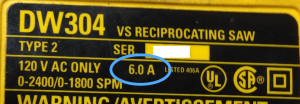
Once you’ve decided the amperage rating you will need, you can use the handy table below to estimate the length and thickness of cord to choose. Again, we like to get a cord with length and amperage rating greater than what you may need since it will meet your potential future needs – but that’s just us.
| Cord length |
Amperage Required & Example Tool Amperages | ||||||
2-5 amps Lamps, fans, weed-eaters |
5-7 amps Leaf blowers, drills |
7-10 amps Lawn mowers, recip saws |
10-12 amps Chain saws, routers |
12-15 amps Circular saws, table saws |
16-20 amps Table saws, circular saws |
||
| 25 feet | 16 gauge | 16 gauge | 14 gauge | 12 gauge | 12 gauge | 10 gauge | |
| 50 feet | 16 gauge | 14 gauge | 14 gauge | 12 gauge | 10 gauge | 8 gauge | |
| 100 feet | 16 gauge | 14 gauge | 12 gauge | 10 gauge | 8 gauge | 8 gauge | |
Common Mistakes in Use
There are numerous ways that people unknowingly misuse their extension cords, though some are more potentially dangerous than others. A full list of common mistakes can be found here, put together by the Electrical Safety Foundation International.
Here is a shortlist of what we consider the most important and commonly overlooked mistakes people make:
Regardless of the gauge of wires or the materials, they are not permanent solutions, as they are not designed to handle the amount of electricity that your home’s electrical system can.
Only use products that have been approved by an independent testing organization such as UL, or CSA.
Never cover a cable while using it, either with a rug, under the floor or in a wall. The heat produced from the electricity cannot escape, producing a massive fire risk. You should also neve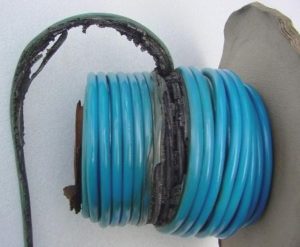 r coil the cord tightly while in use for the same reason.
r coil the cord tightly while in use for the same reason.
Never use a cable with a lower wattage rating than the tool/appliance you are using it with.
People often use too small gauge of wire. While 16-gauge wires are certainly more affordable, the thinner wires can’t handle the same current as a thicker 12-gauge wire can.
Never try and use a 3-prong cable in a 2-slot plug or remove th e third prong to do so. This is a safety feature that when unused can be a serious electrocution and fire hazard.
e third prong to do so. This is a safety feature that when unused can be a serious electrocution and fire hazard.
If you need to use the one outside, be sure to keep the ends dry to avoid electrocution. Most outdoor plugs are GFCI outlets that should prevent this, but best to be safe. Also never store a cable outside as moisture could penetrate the cable or the coating could be damaged by animals or other means.
The ESFI suggests that you should only use a single appliance with a single cable, to avoid undue stress to the wire.
Remember to check out the full list of safety tips from the ESFI, or check out this handy infographic.
Now that you know what size of cable to look for, and how to safely use it, let’s take a look at the products we recommend.
Some Frequently Asked Questions:
Q: How do I safely store my extension cord?
A: Really, there are numerous ways to store them. You can wrap them around a reel, hand coil them, stuff them in a tangled mess into a bin, it’s up to you. Although, you should never cover it with a rug or coil it up while it’s plugged in and in use as this can be a serous fire hazard.
Q: Can you plug a surge protector into an extension cord?
A: Most surge protector units will have directions in the manufacturer’s manual about where the unit should be plugged in. There are differing opinions on whether or not is it is safe, but so long as you use a thick gauge wire (12,10,8) then you should be fine. Learn more here
Q: What gauge extension cord do I need?
A: The exact gauge of wire you need varies on various factors, including what tools and electronics you are going to be using with the cable, and what length of cable you need. In general, we suggest getting a larger gauge wire (12+) so that it is safer and more versatile. This is a handy guide to roughly estimate the gauge you need.
Q: How to wrap an extension cord?
A: If you don’t get a reel like the ones we suggest above, the video below demonstrates a great way to wrap up longer cords.
Bonus Pro Tip:
Tired of your cable’s end coming unplugged from your tool when you come to the end of your reach? Try tying the ends of your cords like this to prevent it from happening!
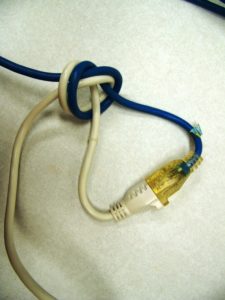
Did this article help you find the right product? Is there something missing from our list you want us to add? Drop us a line in the comments below, we love hearing from our readers!
Disclaimer: Due to the dangers that electrical equipment can pose, ShedHeads is not liable for any damages or injuries from advice taken from this article. The material and information contained on this website is for general information purposes only. You should not rely upon the material or information in this article to undertake any projects you are not qualified to do so. Whilst we endeavor to keep the information up to date and correct, ShedHeads makes no representations or warranties of any kind, express or implied about the completeness, accuracy, reliability, suitability or availability with respect to this article or the information, products, services or related graphics within it for any purpose. Any reliance you place on such material is therefore strictly at your own risk.

